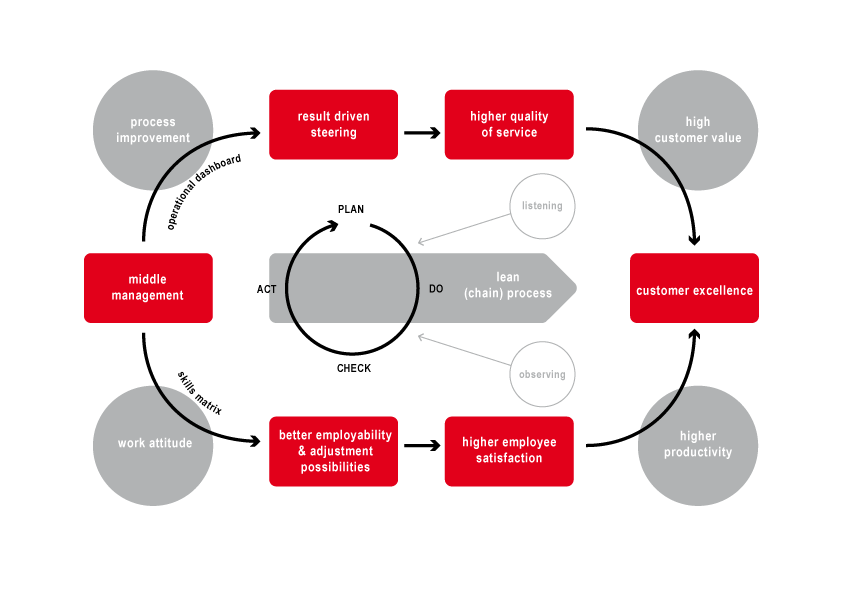The Value Of Middle Management: Benefits For Companies And Employees

Table of Contents
Enhanced Employee Performance and Development
Middle managers are not just supervisors; they are key players in employee growth and performance. Their direct interaction with frontline employees allows for targeted support and development, leading to a more engaged and productive workforce. Investing in middle management training in areas like leadership and mentorship is a direct investment in employee retention and development.
Mentorship and Guidance
Middle managers provide crucial mentorship and guidance, fostering skill development and career progression. This direct interaction facilitates personalized support, addressing individual needs and aspirations.
- Mentoring programs: Middle managers can implement and participate in formal mentoring programs, pairing experienced employees with newer team members. This structured approach ensures knowledge transfer and accelerates learning. Informal mentoring, fostered through regular check-ins and open communication, is equally vital.
- Performance feedback: Regular feedback loops, including both formal performance reviews and informal check-ins, ensure employees understand expectations and areas for improvement. Constructive criticism and positive reinforcement are key components of effective performance feedback.
- Skill development opportunities: Proactive middle managers identify training needs and facilitate access to relevant resources, such as workshops, online courses, and conferences. This demonstrates a commitment to employee growth and enhances skill sets within the team.
Improved Communication and Collaboration
Effective middle managers act as a vital bridge, facilitating clear communication between upper management and frontline staff. This two-way communication stream ensures everyone is informed and aligned, minimizing misunderstandings and improving collaboration.
- Transparent communication: Regular team meetings and open-door policies foster transparency and trust. This allows for open dialogue, addressing concerns and ensuring everyone is on the same page.
- Conflict resolution: Middle managers are often the first point of contact for resolving workplace conflicts. Their ability to mediate disagreements and find solutions is crucial for maintaining a positive work environment.
- Information dissemination: Middle managers efficiently relay strategic goals, company updates, and important information to their teams, ensuring everyone understands the bigger picture and their role in achieving company objectives. This prevents the spread of misinformation and ensures efficient execution of strategic initiatives.
Increased Productivity and Efficiency
Middle management plays a pivotal role in maximizing productivity and efficiency within teams. Their ability to delegate tasks effectively, optimize workflows, and monitor performance contributes significantly to overall organizational success. This translates into tangible results, including on-time project completion and efficient resource utilization.
Task Delegation and Workflow Optimization
Middle managers excel at delegating tasks, optimizing workflows, and ensuring projects are completed on time and within budget. This requires a deep understanding of individual team members’ skills and capabilities.
- Effective delegation: Assigning tasks based on individual strengths and weaknesses ensures efficient task completion and maximizes individual contributions. This also fosters employee empowerment and development.
- Project management: Middle managers oversee projects, tracking progress, identifying and addressing roadblocks, and ensuring projects remain on schedule and within budget.
- Process improvement: Proactive middle managers continuously look for ways to improve processes, identifying inefficiencies and implementing solutions to streamline operations. This focus on continuous improvement leads to enhanced productivity and cost savings.
Accountability and Performance Monitoring
Middle managers hold teams accountable for their performance, tracking progress toward goals and identifying areas needing improvement. This includes establishing clear expectations and providing regular feedback.
- Setting clear expectations: Defining roles, responsibilities, and performance metrics creates a clear understanding of what is expected, minimizing ambiguity and maximizing productivity.
- Regular performance reviews: Constructive feedback during performance reviews helps employees improve their skills and reach their full potential.
- Performance tracking and reporting: Monitoring team progress and reporting to upper management ensures transparency and allows for proactive adjustments when necessary. This data-driven approach informs decision-making and resource allocation.
Strategic Implementation and Innovation
Effective middle managers are not just executors; they are crucial in translating strategic goals into actionable plans and fostering innovation within their teams. This involves breaking down complex objectives into manageable tasks and creating a culture of creativity and continuous improvement.
Translating Strategy into Action
Middle managers translate high-level strategic goals into actionable plans for their teams. This requires a thorough understanding of both the overall strategy and the capabilities of their team members.
- Breaking down complex goals: Defining smaller, achievable tasks helps teams understand how their individual contributions contribute to the larger strategic objectives.
- Resource allocation: Efficiently allocating resources – time, budget, and personnel – to support team initiatives ensures optimal utilization of resources and efficient progress.
- Monitoring progress: Regularly assessing progress toward strategic objectives allows for timely adjustments and course correction, ensuring the team remains on track.
Fostering Innovation and Creativity
Middle managers create a supportive environment where employees feel empowered to contribute innovative ideas and solutions. This encourages a culture of experimentation and continuous improvement.
- Encouraging creative problem-solving: Promoting a culture of experimentation and learning from mistakes fosters innovation and encourages risk-taking.
- Implementing employee suggestions: Actively seeking and implementing suggestions from team members demonstrates valuing their contributions and fosters a sense of ownership.
- Supporting continuous improvement initiatives: Encouraging the team to find ways to improve processes and performance creates a culture of continuous learning and development.
Conclusion
Effective middle management is not just a cost; it's a crucial investment that yields substantial returns for companies and employees alike. By fostering employee development, boosting productivity, and facilitating strategic implementation, strong middle managers are the backbone of a successful organization. Investing in training, development, and supportive leadership for your middle management team is key to unlocking the full potential of your workforce and achieving your business goals. Don't underestimate the significant value of middle management; prioritize their development and watch your company thrive. Learn more about maximizing the impact of your middle management team and discover how to strengthen your organization's overall performance by exploring further resources on effective middle management strategies.

Featured Posts
-
 How Middle Management Drives Company Performance And Employee Satisfaction
Apr 22, 2025
How Middle Management Drives Company Performance And Employee Satisfaction
Apr 22, 2025 -
 In Depth Razer Blade 16 2025 Review Ultra Settings Thin Design And Cost Evaluation
Apr 22, 2025
In Depth Razer Blade 16 2025 Review Ultra Settings Thin Design And Cost Evaluation
Apr 22, 2025 -
 Enhanced Security Collaboration Between China And Indonesia
Apr 22, 2025
Enhanced Security Collaboration Between China And Indonesia
Apr 22, 2025 -
 Alterya Joins Chainalysis Boosting Blockchain Security With Ai
Apr 22, 2025
Alterya Joins Chainalysis Boosting Blockchain Security With Ai
Apr 22, 2025 -
 Razer Blade 16 2025 Ultra Thin Gaming Laptop Performance And Price Analysis
Apr 22, 2025
Razer Blade 16 2025 Ultra Thin Gaming Laptop Performance And Price Analysis
Apr 22, 2025
